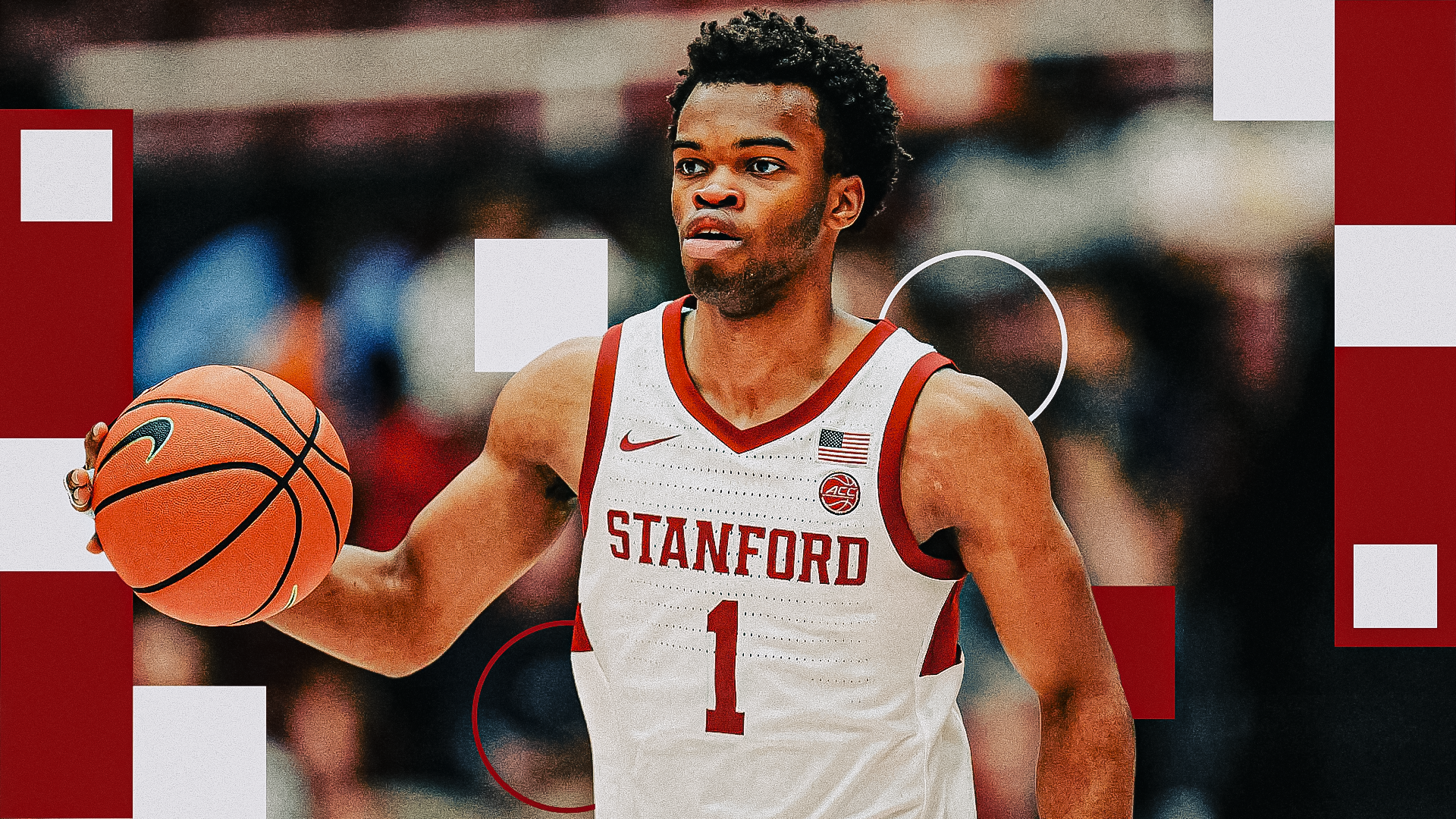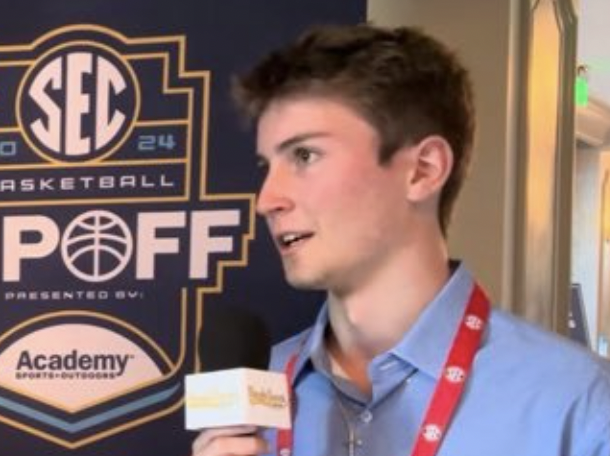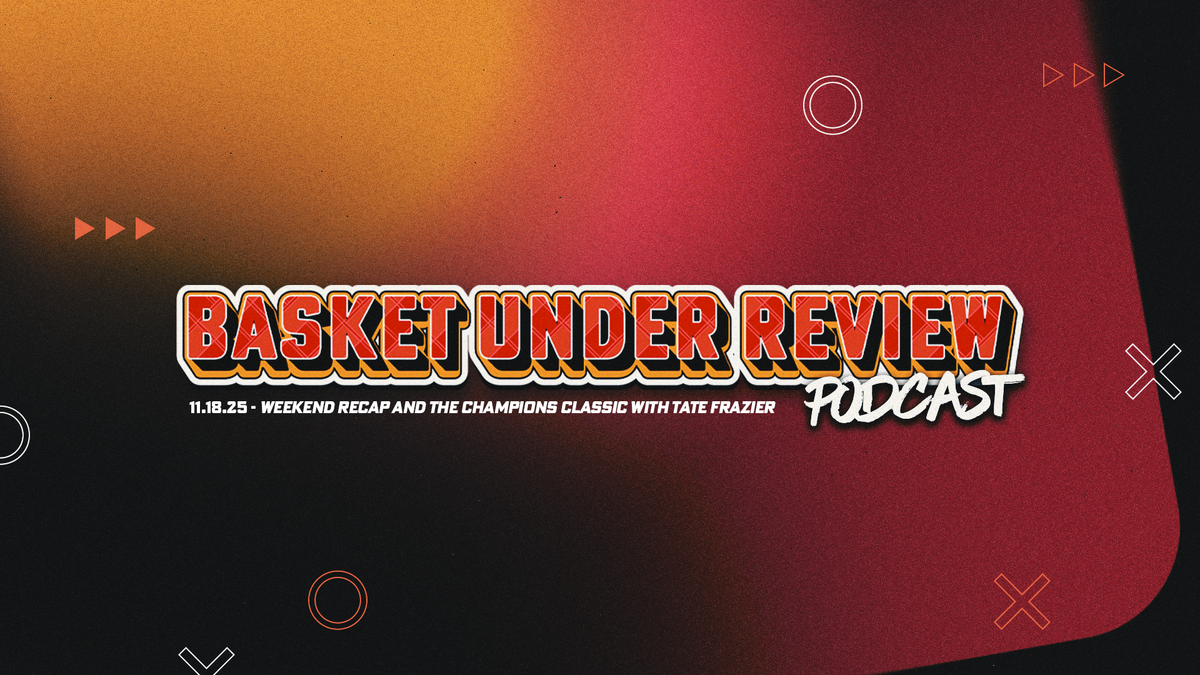Ebuka Okorie’s dad, Charles, has always encouraged him to avoid posting anything on social media about his basketball accomplishments. The philosophy is unconventional in the current state of high school recruiting and may have cost Okorie some of the recognition that he could’ve otherwise received, but Okorie’s dad has always thought the benefits of humility would outweigh the bump in exposure that posting a few highlight reels could get his son.
The idea was that if Okorie’s game was good enough, it would speak for itself and would force others to talk about it. The theory appears to be coming to fruition these days as Okorie’s game has made a bigger statement than he ever could with a few Instagram posts.
Through the first three games of the season, Okorie is averaging 25.3 points per game, is the ACC’s leading scorer, the country’s third-leading scorer and leads a prolific college basketball freshman class in scoring. The Stanford guard is a college basketball dynamo that has catapulted himself into the scoring spotlight without sacrificing efficiency, principles and the ideals that have gotten him here. In a world where the ACC boasts Duke star Cam Boozer, UNC standout Caleb Wilson and Notre Dame freshman Jalen Haralson—a projected first rounder—it’s Okorie that’s scored it the most consistently.
Okorie has since reposted a graphic declaring that he leads all college basketball freshmen in scoring, but doesn’t appear to have forgotten the premise of his father’s message to him.
“I really value being humble and having humility,” Okorie told Basket Under Review. “I have a long way to go, we're only three games into the season so I just take it day by day and go through the full process of staying levelheaded, grounded.”
The national spotlight has the capacity to pervade Okorie’s day-to-day life as he prepares for Stanford’s fourth-consecutive buy game. It’s never had to before, but the impromptu media training and the tactics for dealing with social media notoriety have to manifest themselves quickly for the Stanford guard.
Okorie’s high school coach Jason Smith says that the now Stanford point guard was always “under the radar” as a recruit. Perhaps it was due to playing on teams with high-volume scorers, his understated personality or his dad’s social media ethics, but in any case the one time Harvard commit was nearly an afterthought to power-five programs.
Stanford coach Kyle Smith remembers Okorie as a player that would be a “hard evaluation” as a result of the teams that he played on and the demeanor he possessed. The Stanford coach remembers watching Okorie play alongside current St. John’s guard Joson Sanon—a then five-star recruit that Smith says “shot every time” and initiated everything as the team’s point guard—on their AAU team and thinking that he didn’t quite play “hard enough yet,” but that he admired his handle as well as his movement style enough to compare him to former San Francisco guard Jamaree Bouyea.
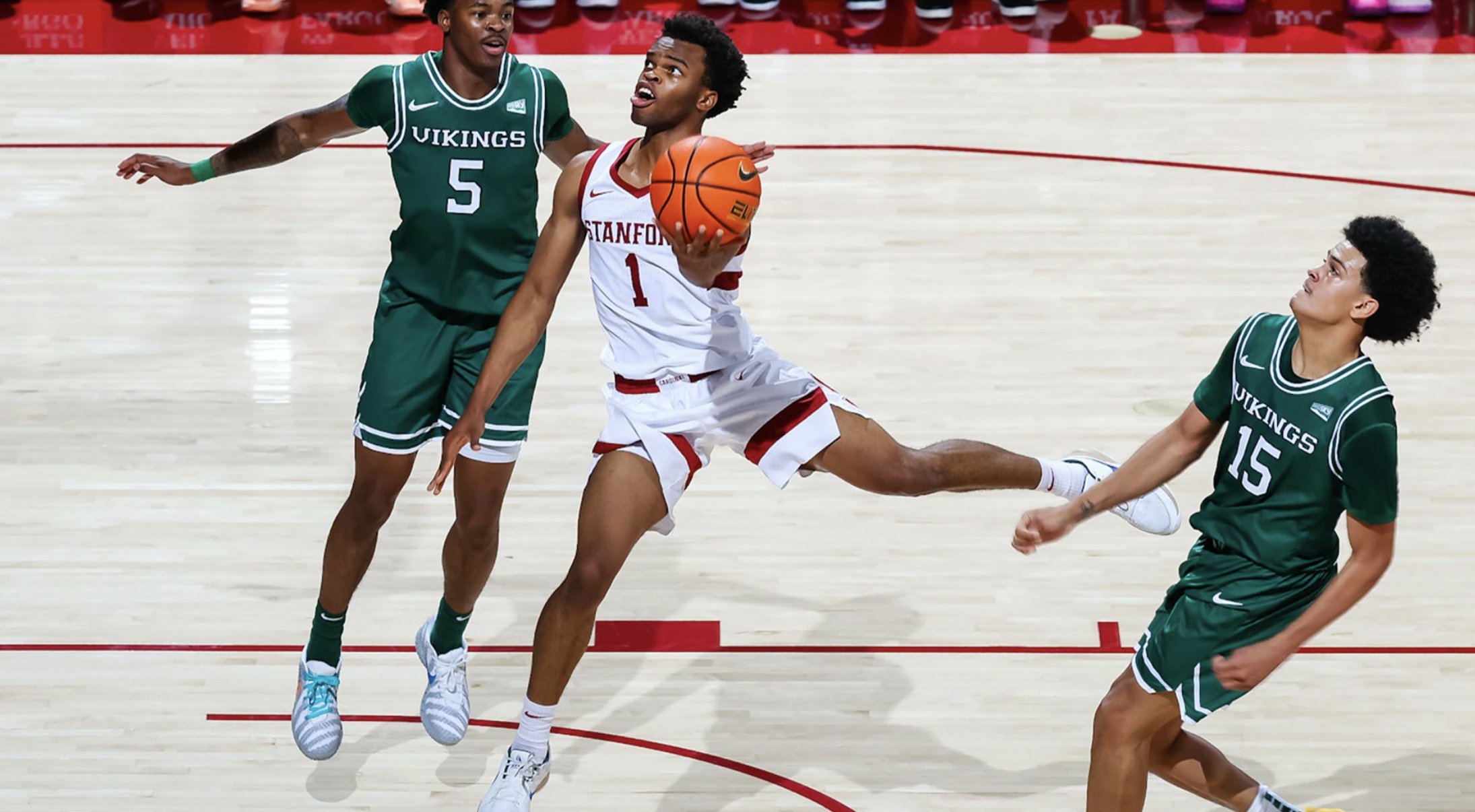
What Okorie has done to this point has been Bouyea—who was among the now-Stanford coach’s best players at San Francisco and led him to the NCAA Tournament—esque. The two players’ shared head coach also says Okorie is further along as a freshman than Bouyea was.
The Stanford guard clearly has a unique off the bounce scoring ability and a flair to his game that allows him to take over a game as a scorer. Okorie hardly shows it as soon as he walks off the court, though. He’s the quiet type that this Stanford coaching staff has attracted over the years, but they don’t believe that makes him any less dynamic when he takes the floor for 40 minutes twice a week.
“He is very quiet, almost very unassuming, very humble,” Smith, the Stanford head coach, told Basket Under Review. “I don't know what his other interests are besides basketball, academics and that's ok.”
In the era of glamour, paydays and extravagant egos defining college basketball stardom, Okorie’s unique way of doing business appears to have him on a track to a similar fate.
The consensus among the Okorie camp is that his lack of affinity for the spotlight has helped him in his pursuit of becoming the player that he hopes to be. He says he doesn’t pay attention to whether he’s underrated or overrated. Instead, Okorie puts all of his stock into what he’s done to get here whether it’s recognized or not.
The work the Stanford guard has done has led his parents to say they’re “not surprised” when they process that their son is the ACC’s leading scorer. Now that Okorie is here–where seemingly nobody outside of his circle thought he’d be this early–he’s not all that caught up in the attention that comes with his three-consecutive 20-plus point games.
“It’s not overwhelming,” Okorie said of the attention and the success he’s had through the season’s first three games. “My hard work is paying off, people are starting to see it. It’s just a really cool experience.”
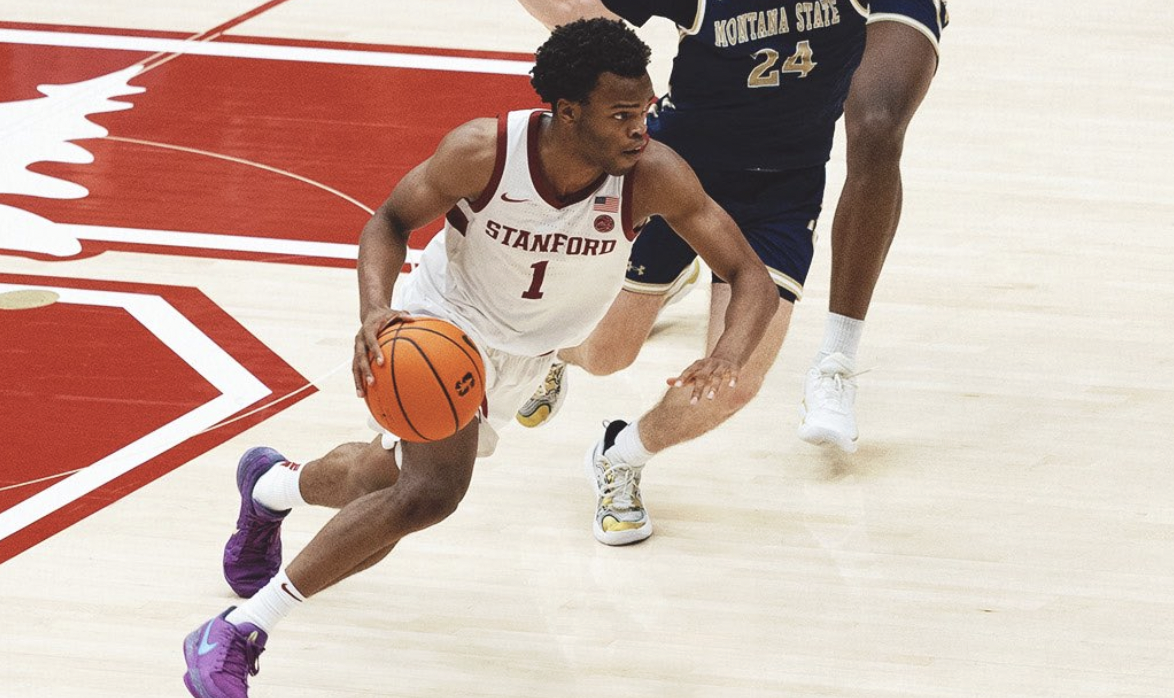
As Okorie popped the door close, sat down and began the two-hour descent from Wolfeboro, New Hampshire, back home to Nashua, New Hampshire, for fall break, he did so while intentionally generating an eerie silence. When the two hour trip was over there was still “no comment” from Okorie, his father says.
In the days prior, Okorie had grown frustrated at how his recruitment had progressed. He had chosen to commit to Harvard over Brown early on in the process and had stuck with his Harvard commitment up to that point as to please his parents. Two of Okorie’s siblings had already gone off to Cornell and his father jokes that he’d become the unofficial Harvard “recruiting officer.”
It all made sense to Okorie’s parents. He’d get an education at one of America’s most prestigious universities and he’d bring great pride to his parents by doing so while playing high-level basketball. When Harvard called and Okorie had to decide before they went elsewhere with their recruiting efforts, his mom says that she and her husband said “what are you waiting for? Why don't you just go ahead with them?”
“His commitment to Harvard really was because of us, the parents,” Okorie’s mother Ljeoma said. “I’ll say that just because of the pressure from us, he ended up committing.”
“We forced him,” his father added.
When the car passed the old-school brick buildings and bristling trees of Okorie’s hometown and eventually pulled in around the family’s house, he got out and told his father that he needed to speak with him and his mother about something serious.
In hindsight, Okorie’s high school coach calls the meeting a “heart-to-heart” between the point guard and his father.
The family motto his father came up with is “grades first, then game, you have to make your grades first then you can go to the basketball court and take every other person to the cleaners.” The philosophy behind the family ideal drove the initial decision for Okorie to choose Stanford and while it didn’t have to be disregarded, it could no longer be the sole factor in the decision.
Okorie had always put himself in a position to have those doors open academically, but he wanted something beyond just a degree. The then-Brewster Academy guard always wanted to play “high level” basketball, which led him to the discussion he would have to have with his parents that day.
“I want you to do something for me,” Okorie told them.
“What is it?” His father responded.
“Go to Harvard and tell them I want to decommit,” Okorie said.
Okorie says the conversation “wasn’t that difficult” because his parents knew that he had aspirations of playing basketball at a more traditional basketball school rather than a midmajor. His parents understood their son’s aspirations and say they made sure not to put pressure on his second decision in the same way that they did throughout his first one, but they still needed to see it to believe it in regard to the idea that passing up on Harvard was a good idea.
Okorie’s father told him that he would call the Harvard staff to deliver the message to them as long as his son could confidently say that in 20 years he wouldn’t come back to him and say that he “blew it” and should have listened. Okorie immediately responded that he wouldn’t, thus his father made the call and told them that his son had decided he wasn’t coming to Harvard.
“I tried to go to church,” Okorie’s father jokes in hindsight. “I thought the Devil had gotten into his head. I did a lot of prayers because I could not explain to anyone that my son got an offer from Harvard and he turned it down and I could not convince him to go to Harvard.”
Stanford’s staff had been involved in Okorie’s recruiting process prior to his commitment to Harvard based on the recommendation of Smith–the Brewster Academy head coach–but was hoping that he’d hold off on committing to Harvard until a few of their other targets came off the board. When they got word that Okorie was committing to Harvard, the Stanford staff “left it alone.”
Eventually the Stanford staff caught wind that Okorie believed he’d made a hasty decision and that they initially “didn’t want to mess with it” because Smith–the Cardinal head coach, who spent time in the Ivy League as Columbia’s head coach–knew what it felt like to lose his players as a member of the conference. Smith–the Stanford head coach–had already taken 16.5 point per game scorer Chisom Okpara from Harvard coach Tommy Amaker–an action that warranted him calling Amaker out of good faith–in the transfer portal and says he’d feel “terrible” if he took another player from him. College basketball’s current world is cold and inconsiderate, though.

When Smith–the Brewster Academy coach–got on the phone, he was still “adamant” that Okorie was “pretty good” and that Smith–the Stanford coach, who had recently connected with the Brewster Academy coach over a player of that decommitted from Stanford upon the arrival of the new staff–would be wise to recruit him. Eventually, the Stanford staff came to watch Okorie in person within a week, brought him on a visit and became the only publicized power-five offer that the Brewster Academy guard had before committing to the Cardinal.
“Ever since I was younger I’ve wanted to go to the NBA and Stanford I felt like was the best opportunity for me to pursue that goal,” Okorie said. “I also felt like it would set me up for things other than basketball.”
Okorie’s parents were relatively unfamiliar with Stanford and what it could provide academically prior to his official visit, but they liked what they heard about the school’s academic prowess and eventually bought into the idea that it could be the best situation for their son.
“My son has always been training for the NBA and that’s the only reason I would allow him not to go to Harvard,” Smith–the Stanford head coach–said Okorie’s dad told him on the visit prior to Okorie’s commitment. After three games and just short of four months of school, Okorie’s dad is bought in on his son’s final choice.
“He nailed it,” Okorie’s father said.
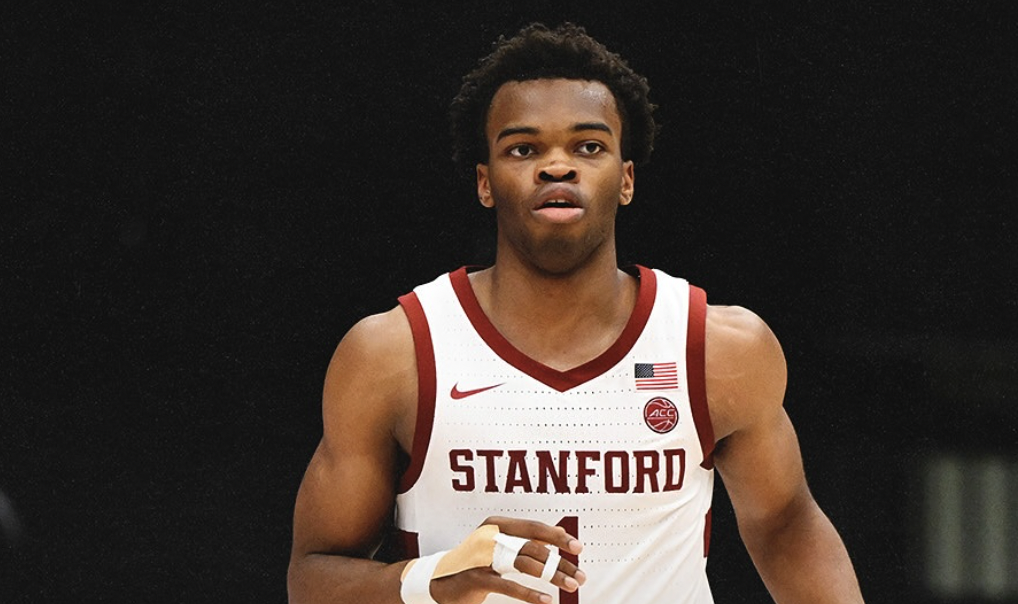
The Okorie’s feel as if they’ve been “blessed” and have their feeling reinforced nearly every day as they operate a non profit named the Thank You Project, which Okorie’s father formed in 2014 to provide safe drinking areas, scholarships and community spaces for worship in Nigeria.
Okorie’s dad chose to pursue architecture as a career because of what he perceived to be an “ability to affect positive change in his rural Nigeria” through it. After being denied admission in his first attempt to attend college, he prayed “God, if I am able to pass this JAMB exam and get into college to study architecture, I will worship you as long as I live. I will use the fruits of my labor as an architect to glorify your name and to serve humanity.”
Since then the fruits of his labor have helped the non-profit organization to dig seven wells while sending a mechanical engineer, a medical student as well as a law school student to school via its scholarship program.
“We have been blessed as a family in numerous ways since we came to this country,” Okorie’s father said. “We feel obligated because we know it's not just for us as individuals to suck it all in, but we are supposed to serve as a channel to pass it on and make life better for the next person.”
Smith–the Brewster Academy head coach–doesn’t have to go back far to find an example of that principle manifesting itself outside of the family’s charity work, neither does his 10-year old son. The Okories visited a Brewster Academy game the night of Stanford’s game against Montana State and gifted Smith’s son a Stanford hoodie that they’d bought for him at the Stanford bookstore on their last trip out west.
Okorie has been involved in his parent’s charity since he was a kid and has often heard his father’s messages in regard to giving back. The family as a whole has developed a passion for giving back to a place that’s imperative to their development.
“It’s really taught me to put life into perspective,” Okorie said. “If I have a bad practice, I'm not playing as well as I have, I have gratitude. I have food, a roof over my head that other people across the world don’t have, like water, so it's always something to be grateful for what I have and also it’s important to give back to people less fortunate than me.”
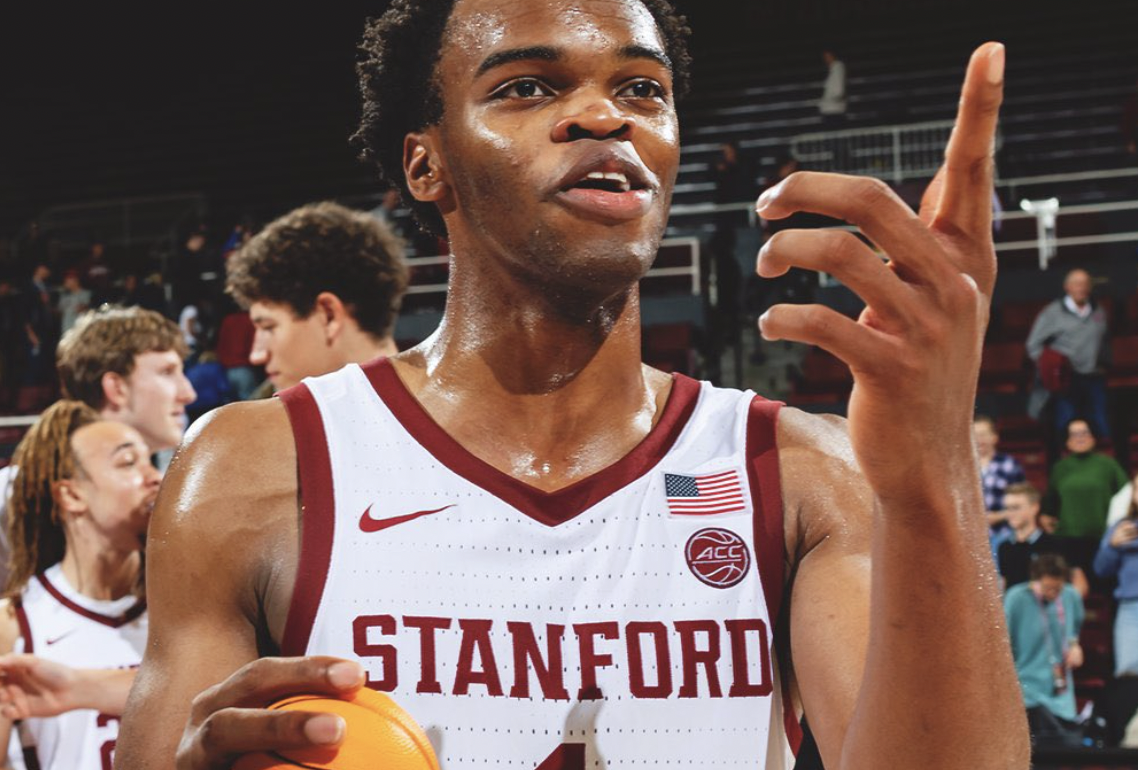
The sea of empty red seats in Stanford’s Maples Pavillion throughout Okorie’s 21-point outing in a Cardinal win over Montana State indicate that for a star to emerge enough to engage a suffering fanbase, he has to demonstrate that he can do something something that hasn’t been done since 2013-2014 around these parts.
Smith–the second-year Stanford head coach–has developed a reputation over the years as a fixer of programs that have been downtrodden for one reason or another. He took Washington State to the tournament for the first time since 2008 in a historic 2022-2023 season, his time at San Francisco, Columbia and Saint Mary’s saw similar results with similar track records of success prior to his arrival.
None of Smith’s stealthy rebuilds have occurred without a core that has believed in what he’s building and has transcended their initial perceived value in college basketball communities. If he’s going to do it at Stanford, it appears as if it’s going to be with Okorie as a significant part of it. That’s a reality he embraces.
“I won’t put any ceiling on him,” Smith said. “I think he's developing into a guy that can play 30 minutes a game. We wanna get where we don't have to have him score 20+ every night. That's a lot to do, especially as a freshman. I don’t want to put too much heat on him, but let him go as he goes.”
If the body of work Okorie has established over the past few seasons, it appears as if he’ll be a piece that this program can rely on as a go-to guy down the stretch of its season. His numbers at this stage are unsustainable, but the regression doesn’t have to nullify his impact. At the very least, it appears as if Okorie’s wealth of experience playing alongside other Division-I players over the years will propel him into a more significant role in the ACC’s freshman of the year race than his recruiting ranking would’ve indicated.
Stanford has had its fair share of standout freshman guards over the years–many of them coming without much buzz–but Okorie appears to have a chance to be the most accomplished of them all when it’s said and done. Those around him believe he’s been built for this since winning a free throw shooting contest as a six-year old playing against older competition, perhaps this is fate.
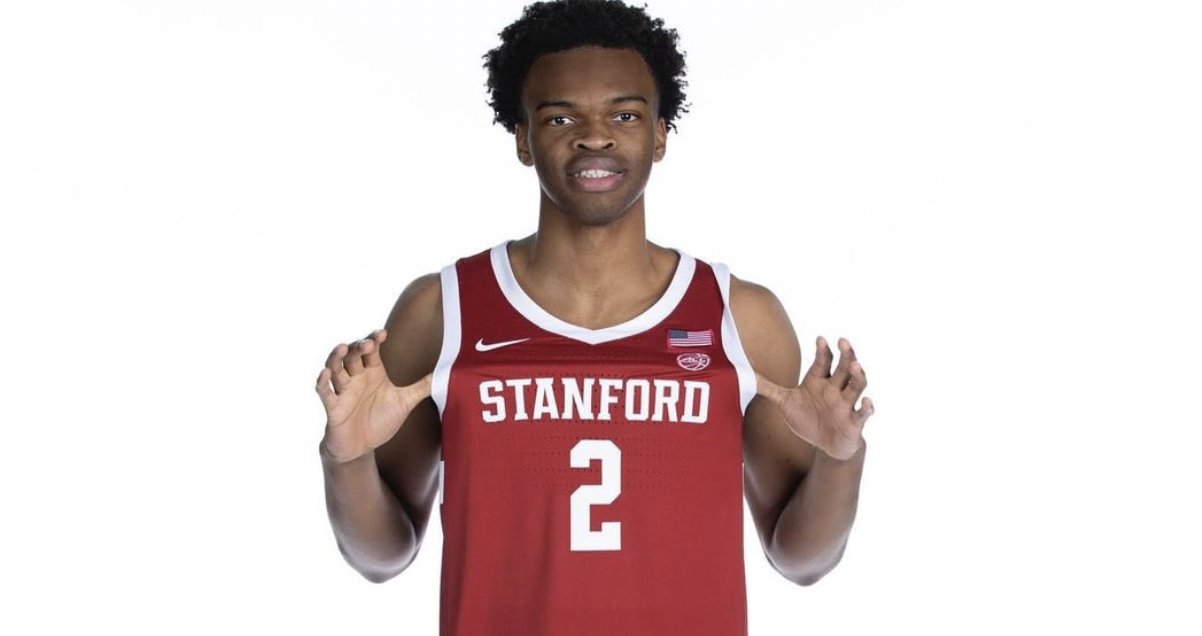
“It’s like people who asked me if I was surprised that Donovan Mitchell has had the success he’s had in the NBA,” Smith–the Brewster Academy coach who coached Mitchell as a high schooler–told Basket Under Review, “Not really because I saw the work. I saw the work that he put in every day and the type of person he was, never too high, never too low. Ebuka is very similar.”
Don’t exchange Okorie’s consistency and humility for a lack of confidence at this stage of his career. Perhaps he won’t speak out like those around him will, but the performances he’s put on through the college basketball season’s infancy as a neglected recruit are impossible without a nearly impenetrable confidence.
It appears as if those around him believe that this isn’t the end of Okorie’s run in with stardom.
“What he’s doing now, we are not surprised,” Okorie’s dad said. “If you put him on an NBA team today, he will do the same thing.”

